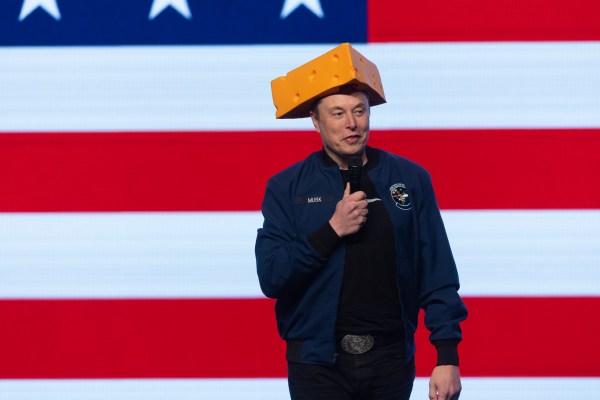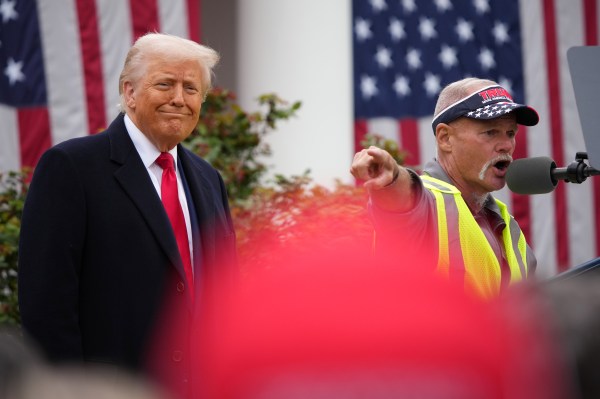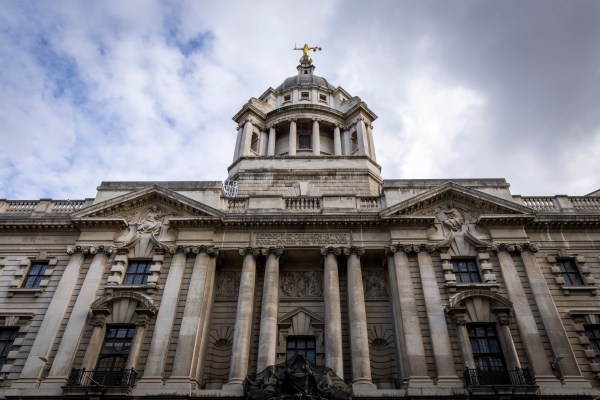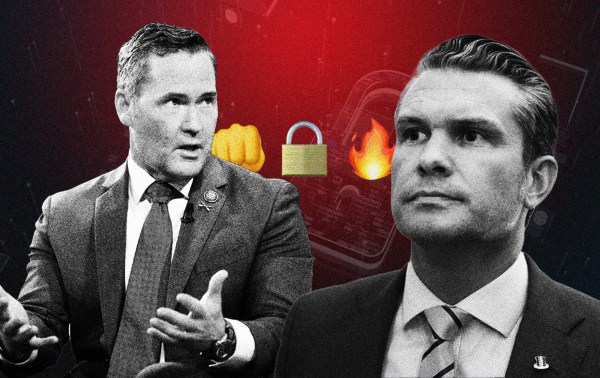Gift this article

Use the options below to copy or email a special link so that friends or family can access this article without a subscription.
Happy Thursday! President Donald Trump announced his long-awaited tariffs plan on Wednesday, targeting the obvious heavy economic hitters like China. But they also include remote territories such as the sub-Antarctic Heard Island and McDonald Islands. Because running trade deficits with a bunch of elephant seals and king penguins is apparently the worst.

We at TMD know better than to say that TikTok’s time might be up—or at least we do now. But with only three days before a ban may actually take effect, we’d be lying if we weren’t curious how everyone’s TikTok dances would look on our LinkedIn feeds.
If the popular streaming app’s China-based parent company, ByteDance, wants to keep its 170 million American users off of its competitors’ apps, it has until Saturday to sell TikTok’s U.S. operations or face a ban. There have been rumors of interested buyers, but so far, nothing official has materialized. As the Trump administration’s deadline looms, it remains to be seen whether ByteDance will pull out a last-minute deal or be forced to exit the U.S. market.
Regulation of TikTok had been discussed for years when in April 2024, Congress finally passed a bill giving ByteDance until January 19 of this year to find a buyer. ByteDance challenged the constitutionality of the law, but the Supreme Court upheld the ban two days before it was set to take effect. Then upon taking office earlier this year, President Donald Trump extended the app a lifeline, directing the attorney general not to enforce the law for 75 days to give ByteDance an opportunity to find a U.S. buyer.
However, the national security concerns that led to the law in the first place remain. “Chinese tech companies have basically been forced by the government to provide access [to] the data that’s in their systems, and most of them have complied,” Rita McGrath, the academic director in executive education at Columbia Business School, told TMD. “There’s lots of sensitive information on TikTok about Americans going back years,” she added. The Chinese government could use the information against Americans, including as blackmail.
China could also use TikTok to manipulate what content its U.S. users see. “With a flick of a switch, they could change what’s coming into people’s feeds, they could send out misinformation, they could present stories that are confusing,” McGrath said. And this may be already happening, as we wrote in January:
A study by the Network Contagion Research Institute at Rutgers University found that topics like the Hong Kong protests, Tibet’s territorial dispute with China, and the plight of the Uyghurs are noticeably under-represented on TikTok when compared to its direct competitor, Instagram Reels. The research institute’s founder concluded that it was “not believable” that the phenomenon had happened organically.
Such capabilities may be merely pernicious now, but they would be disastrous in the event of a future geopolitical confrontation involving the U.S. and China. “You can imagine, China and the U.S. get into a war over Taiwan. Suddenly, TikTok is flooded with pro-China, anti-Taiwan propaganda,” Alan Rozenshtein, an associate professor at the University of Minnesota Law School and a former Justice Department lawyer who worked on cybersecurity and foreign intelligence issues, told TMD. “If that’s organic, if that’s what the users think—that’s fine, that’s First Amendment-protected. But what’s not protected is the Chinese government getting to manipulate that algorithm for its own geopolitical ends.”
In the final months of his first term, Trump tried to ban TikTok via an executive order but had a change of heart following the announcement of a deal between Walmart, Oracle, and ByteDance that fell apart soon after he left office. Recently, however, Trump has taken a much friendlier approach to the social media app—perhaps in no small part because of its role in boosting his own popularity. “For all of those that want to save TikTok in America, vote for Trump,” he said in a September 2024 campaign video. “I’m now a big star on TikTok.”
The bill passed by Congress last year attempts to put TikTok in American hands by forcing ByteDance into a “qualified divestiture.” We’ll soon know whether ByteDance really will sell its interests, but prospective buyers abound. Oracle is reportedly in talks to acquire the app, as are the private equity firm Blackstone and the venture capital group Andreessen Horowitz. Los Angeles Dodgers owner Frank McCourt and Kevin O’Leary of Shark Tank fame put in a bid in January, as did AI company Perplexity and a group of investors including YouTube sensation MrBeast. Just yesterday, Amazon reportedly made a last-minute offer of its own.
ByteDance, meanwhile, continues to drag its feet on calls for it to part ways with the popular app’s U.S. operations—likely at the behest of Beijing. “There have been negotiations on a potential buyer, but there has been very little information that has come out,” Darrell M. West, senior fellow in the Center for Technology Innovation at the Brookings Institution, told TMD. “We don’t know what ByteDance will approve or what the Chinese government will approve.”
Last month, Trump tapped Vice President J.D. Vance and National Security Adviser Mike Waltz to oversee efforts to broker the app’s sale to a U.S. buyer. The pair—along with Trump, Commerce Secretary Howard Lutnick, and National Intelligence Director Tulsi Gabbard—met on Wednesday to consider potential investors. Although the contours of the prospective deal remain unclear, Vance projected optimism following the meeting: “There will almost certainly be a high-level agreement that I think satisfies our national security concerns, allows there to be a distinct American TikTok enterprise.”
But some analysts worry it could involve concessions to Beijing. “China is a very transactional place. If they have to give up something really valuable, like ownership of a major company, they’re not going to do that for nothing,” West said. “They will ask for things in return, and the question is, what is Trump willing to give up?”
Trump has already floated ways to sweeten a TikTok deal for China. “Maybe I’ll give them a little reduction in tariffs or something to get it done,” he said to reporters last week.
There’s also the question of what’s actually for sale. While the TikTok branding and user base are certainly sought after, the app’s content recommendation algorithm is arguably what made it a knockout success. “It’s a valuable property. I think the question is, is it as valuable without the algorithm? Because ByteDance has already very clearly said that it’s not giving that up,” McGrath said. An American company could still acquire the user base without the algorithm, but the absence of one of TikTok’s main draws might make a deal less appealing to American buyers.
One of the deals the Trump administration is reportedly considering keeps the algorithm intact by leasing it to a U.S. entity created by Oracle. But this solution could raise issues about how divested ByteDance truly is if TikTok’s algorithm is still largely its own code. TikTok itself proposed a similar deal to the Biden administration that, among other concessions, allowed Oracle to audit the app’s algorithm. The Biden administration rejected the offer as “insufficient” to address national security concerns.
If ByteDance and a U.S. company are not able to reach a deal, the app will likely be removed from app stores. But the president could always opt to extend the deadline again—as he emphasized this week. “But people should be concerned about this because Congress passed a very clear piece of legislation, and a president can’t just nullify a law and say, ‘It’s not going into effect because I said so,’” West said. “That sets a terrible precedent for other legislation.”
Assuming Trump lets the ban take effect, U.S. firms could face a reaction from Beijing. “China sometimes retaliates against American companies that are operating in China,” West said. “There are many U.S. companies there—many iPhones are made in China—so there’d be a whole host of opportunities if China wanted to be tough.”
But amid the uncertainty, Trump remains optimistic that a deal will come through. “We have a lot of enthusiasm for TikTok, for buying it. I think TikTok is good,” he said. “I was a great TikTok guy.”









Axios: Trump’s Tariffs List Is Missing One Big Country: Russia
President Trump unveiled tariffs of at least 10% Wednesday on virtually the entire world, with one notable exception: Russia.
Press Secretary Karoline Leavitt told Axios Wednesday that Russia was left off because U.S. sanctions already “preclude any meaningful trade.” However, the U.S. still trades more with Russia than with countries like Mauritius or Brunei that did make Trump’s tariffs list.
In honor of the cast announcement for four Beatles biopics—one for each band member—set to hit theaters in April 2028, the legendary band’s 1969 rooftop performance is worth a watch.
What do you make of Donald Trump’s reciprocal tariffs?